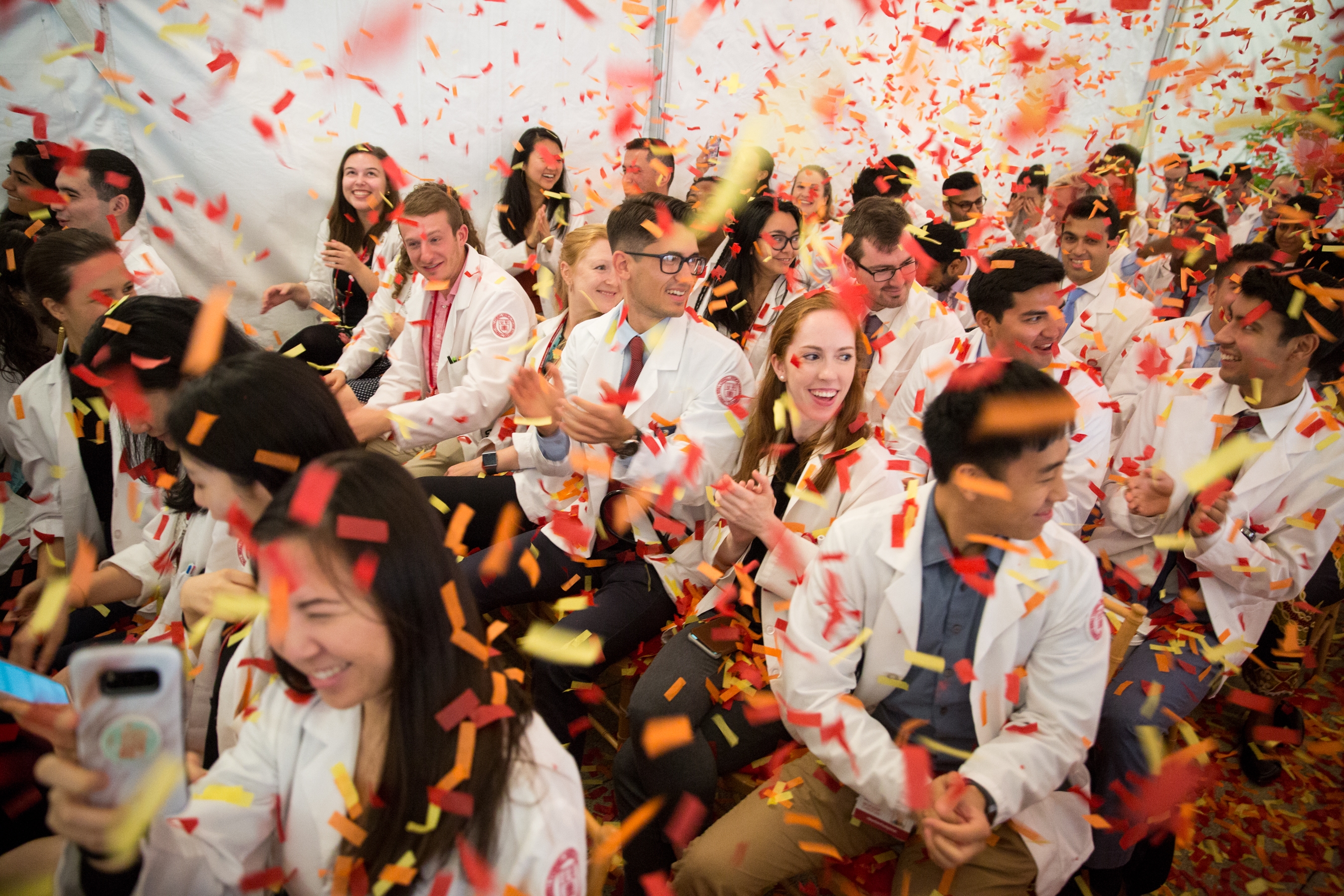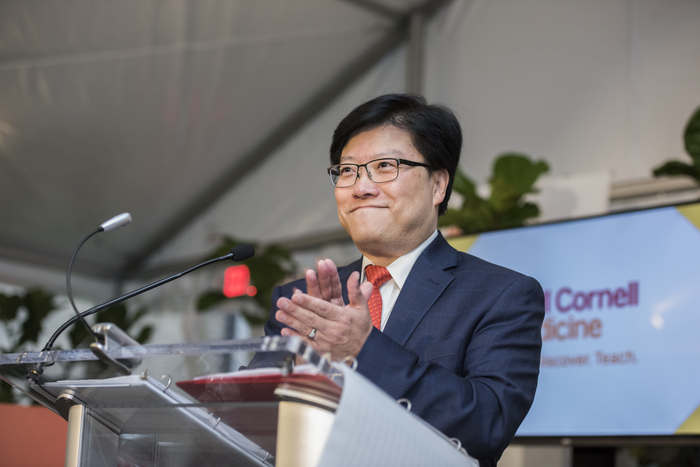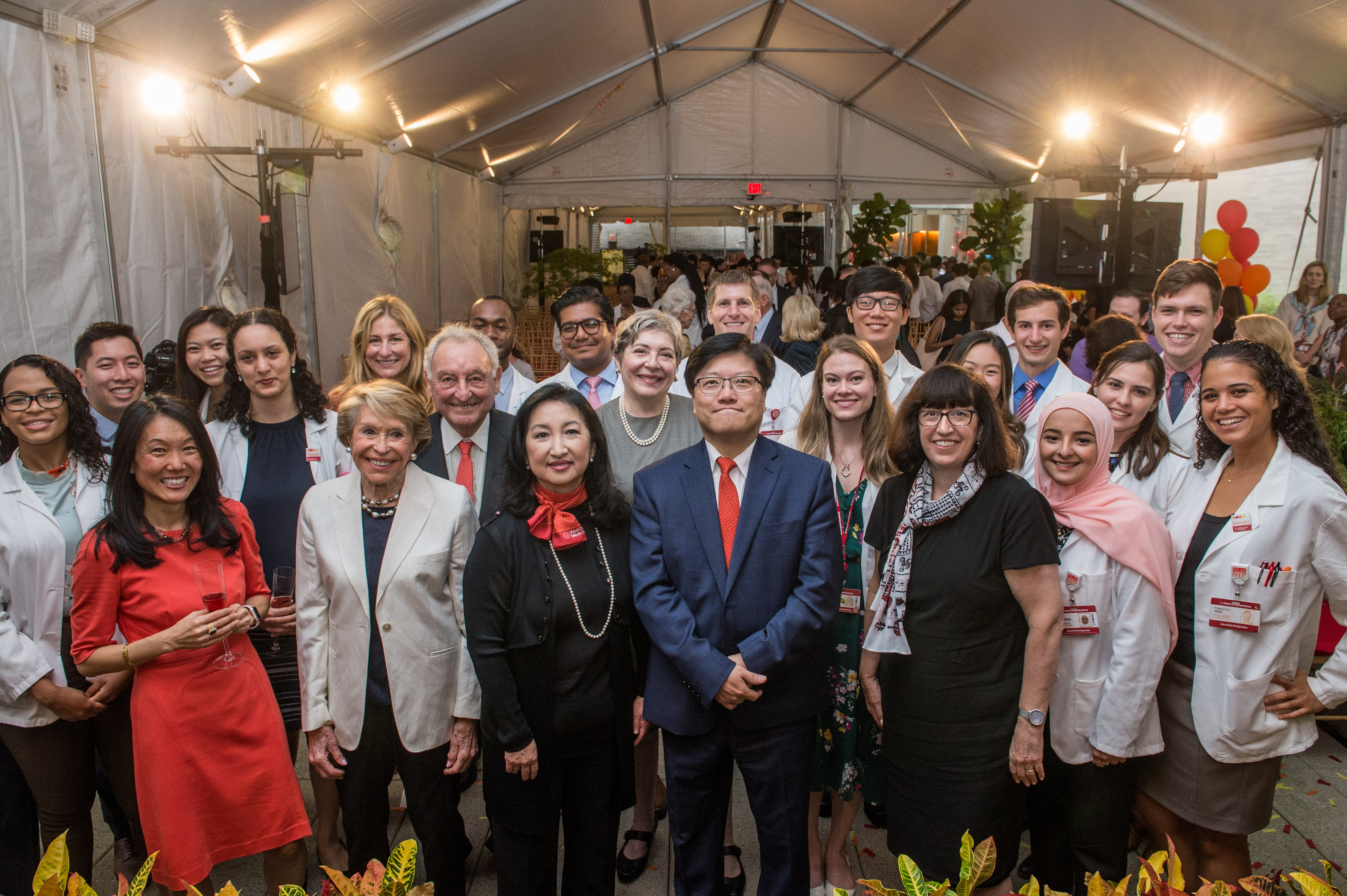
Weill Cornell Medicine medical students react to the institution's scholarship announcement on Sept. 16. Credit: Ashley Jones
Watch a video of the full announcement here.
NEW YORK (September 16, 2019) – A transformative new scholarship program established by Weill Cornell Medicine will eliminate medical education debt for all students who qualify for financial aid, the institution announced today. A lead gift from The Starr Foundation, directed by Weill Cornell Medicine Overseer Maurice R. Greenberg, in partnership with gifts from Joan and Board of Overseers Chairman Emeritus Sanford I. Weill and the Weill Family Foundation have made this longstanding goal possible. Through these landmark gifts, including those from other generous donors that together total $160 million, the institution will ensure that the best and brightest aspiring doctors have the financial support and freedom to seek careers in medicine.
The game-changing new financial aid program expands Weill Cornell Medicine’s scholarship offerings to provide debt-free education to all medical students with demonstrated financial need beginning with the 2019-2020 academic year and then every year thereafter in perpetuity. By replacing student loans with scholarships that cover tuition, housing and other living expenses, the program ensures that all students, including those from economically diverse backgrounds, can pursue their medical education without financial burden. This program empowers students to ultimately focus their careers on their interests and talents, rather than the requisite future salaries to repay their loans.

Dean Augustine M.K. Choi announces Weill Cornell Medicine's new scholarship program at an event on Sept. 16. Credit: Studio Brooke
“Weill Cornell Medicine has been a leader in medical education since its inception in 1898, dedicated to training outstanding physicians and scientists from all walks of life,” said Dr. Augustine M.K. Choi, the Stephen and Suzanne Weiss Dean of Weill Cornell Medicine and provost for medical affairs at Cornell University. “It is with extraordinary pride that we are able to increase our support of medical education for our students, ensuring that we can welcome the voices and talents of those who are passionate about improving human health. We are profoundly grateful to The Starr Foundation and Maurice and Corinne Greenberg, Joan and Sandy Weill, the Weill Family Foundation, and many other Weill Cornell Medicine donors for making this possible and helping us change the future of medical education.”
“This bold initiative to eliminate medical education student debt ensures that every student who wishes to become a doctor can do so—for their betterment and for the patients they serve,” said Martha E. Pollack, president of Cornell University. “By investing in our medical students, we impart a lasting, positive effect on the healthcare landscape across the country.”
The expanded financial aid program is the culmination of three decades of philanthropy from numerous Weill Cornell Medicine benefactors whose gifts have established and strengthened the institution’s scholarship endowment. The Starr Foundation’s lead gift toward scholarship—the single largest in its history—together with the Weills’ and their family foundation’s pivotal support, makes this new program possible. Significant gifts from Christine Seix and Overseer Robert S. Dow, who in March made an eight-figure commitment toward scholarship support, and a multitude of generous donors and alumni have enabled Weill Cornell to reach this milestone. To ensure this program continues in perpetuity, the institution will need to raise additional money to fully fund its scholarship endowment.
“Students whose passions, skills and talents point the way to medicine can now pursue their career aspirations, unencumbered by the pressure that comes with significant debt burdens,” said Jessica M. Bibliowicz, chairman of the Weill Cornell Medicine Board of Overseers. “We are immensely thankful to our visionary donors, who are committed to making this program possible for our students.”

Weill Cornell Medicine leaders, benefactors and students gather at an event Sept. 16. celebrating a new institutional scholarship program. Those pictured include (from left), Dr. Yoon Kang, Joan Weill, Dr. Mary E. Choi, Dr. Augustine M.K. Choi and Martha E. Pollack in the first row; Sanford I. Weill and Florence Davis in the second row; and Jessica M. Bibliowicz in the third row. Credit: Studio Brooke
“It is a great privilege to make such an important and impactful contribution to the futures of our medical students,” said Overseer Greenberg, chairman of The Starr Foundation and the architect of this ambitious new scholarship program. “Scholarships are crucial to the success of our trainees, freeing them from the weight of excess debt that has traditionally accompanied medical education. We couldn’t be more pleased to support our students as they work to improve the lives of patients worldwide.”
“Joan and I and the Weill Family Foundation have been honored to support Weill Cornell Medicine’s mission over the last 30 years, making an impact where the need is greatest,” said Overseer Weill, chairman emeritus of Weill Cornell Medicine’s board. “Providing debt-free medical education isn’t just what’s right for our students; it is critical to creating the best doctors for all generations to come. We are proud to be champions of our students at one of the most pivotal times of their lives.”
Historically, more than half of Weill Cornell Medicine’s medical students have received need-based scholarships to help defray the institution’s cost of attendance, which is an average of $90,000 a year, and have taken out loans to cover the difference. Now, under the new financial aid program, all medical students who qualify for aid will be able to forego that borrowing and have their medical education—including tuition, books, housing, food and related expenses—covered by scholarships. Students pursuing dual M.D.-Ph.D. degrees, through a separate program, receive full tuition and stipends for living expenses from the National Institutes of Health and Weill Cornell Medicine. Together, these two programs will now enable two-thirds of Weill Cornell Medicine’s medical student body to graduate without debt.
The newly announced financial aid program will ensure that medical students who qualify for aid do not accumulate new medical education-related debt starting in the 2019-2020 academic year. First-year students in the Class of 2023, entering this fall, and those in every subsequent entering class will have their student loans replaced by scholarships for the entirety of their education at Weill Cornell Medicine. Returning aid-eligible students who matriculated prior to this year will receive scholarships to replace their loans for this year and their remaining years as Weill Cornell Medicine medical students.
Enhanced Student Experience
This change in Weill Cornell Medicine’s scholarship offerings is the foundation of a comprehensive suite of initiatives to enhance the life and well-being of its students.
To help students realize their educational aspirations, Weill Cornell Medicine is developing modern and nurturing learning and living environments that promote student wellness, collaboration and engagement. A $12.5 million gift from the Feil family in 2017 funded the construction of the Feil Family Student Center, which will expand the institution’s dedicated student space by nearly 75 percent when it opens in October. The 16,200-square-foot space, housed in the main campus buildings on York Avenue, will offer a place for classes, meetings, quiet study and informal gatherings to bring students together in the heart of the institution. It will complement the Weill Education Center, established in 1996 by the Weill family and other generous donors, and renovated in 2015.
A vibrant new residence hall within walking distance of Weill Cornell Medicine’s main campus is in development, pending additional fundraising, with expected occupancy in 2023. With an estimated 148,000 square feet, the building, located at the corner of East 74th Street and York Avenue, will feature modern living conveniences and will house 300 students, nearly doubling Weill Cornell Medicine’s residential capacity. This new residence hall will augment the institution’s recently renovated student living space, Lasdon House, which features a wellness and fitness center that opened in 2018.
Underscoring its commitment to student wellness, Weill Cornell Medicine conceptualized and will host the inaugural National Conference on Medical Student Mental Health and Well-Being later this week, on Sept. 18-19. Some 350 medical school deans, senior faculty leaders, university and teaching hospital administrators, faculty physicians, researchers, mental health professionals and medical students from peer institutions across the country have registered to attend. The symposium will highlight the challenges to well-being in the medical school setting and identify innovative approaches to resilience training and mental health treatment that can be implemented as new best practices at medical schools around the country.
To ensure that its students and future physicians reflect the patients they will serve, Weill Cornell Medicine has expanded the breadth and depth of numerous initiatives intended to increase representation of women and minorities in medicine and provide the mentorship necessary for all students to succeed. The institution was recently awarded two grants from the National Institutes of Health, as well as one from the Health Resources and Services Administration of the U.S. Department of Health and Human Services, to strengthen the pipeline of graduate students and medical trainees from communities historically underrepresented in the STEM fields. In 2018, Weill Cornell Medicine also introduced the Dean’s Diversity Scholarships, which provide full-tuition scholarships to two medical students annually from diverse communities. The medical school’s top-ranked curriculum also includes the Areas of Concentration program, in which all students are paired with a mentor in their first year, who provides guidance as students explore and ultimately conduct scholarly work. Weill Cornell Medicine has the highest proportion of M.D. graduates becoming full-time academic faculty—nearly 40 percent—according to data from the Association of American Medical Colleges.
Weill Cornell Medicine
Weill Cornell Medicine is committed to excellence in patient care, scientific discovery and the education of future physicians in New York City and around the world. The doctors and scientists of Weill Cornell Medicine — faculty from Weill Cornell Medical College, Weill Cornell Graduate School of Medical Sciences, and Weill Cornell Physician Organization—are engaged in world-class clinical care and cutting-edge research that connect patients to the latest treatment innovations and prevention strategies. Located in the heart of the Upper East Side's scientific corridor, Weill Cornell Medicine's powerful network of collaborators extends to its parent university Cornell University; to Qatar, where Weill Cornell Medicine-Qatar offers a Cornell University medical degree; and to programs in Tanzania, Haiti, Brazil, Austria and Turkey. Weill Cornell Medicine faculty provide comprehensive patient care at NewYork-Presbyterian/Weill Cornell Medical Center, NewYork-Presbyterian Lower Manhattan Hospital, NewYork-Presbyterian Queens and NewYork-Presbyterian Brooklyn Methodist Hospital. Weill Cornell Medicine is also affiliated with Houston Methodist. For more information, visit weill.cornell.edu.
